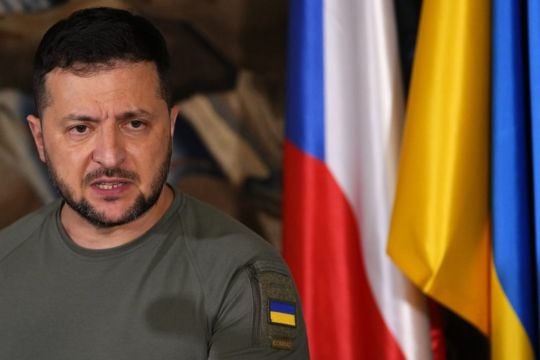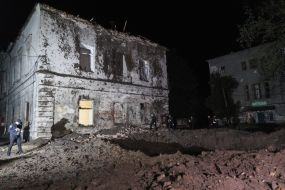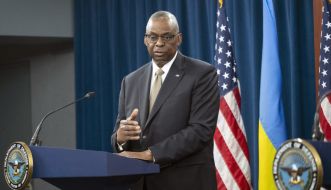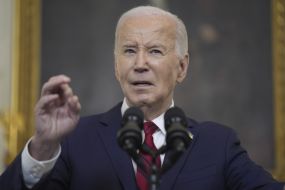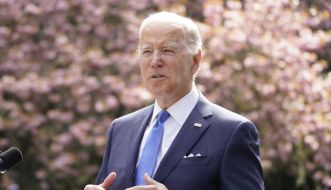Ukrainian president Volodymyr Zelenskiy has visited the capitals of Bulgaria and the Czech Republic, discussing military aid and receiving assurances of support for Ukraine’s entry into Nato after the war with Russia is over.
Czech president Petr Pavel said it is in the interest of his country and Ukraine that as soon as the war ends negotiations about Nato membership begin.
“I’m convinced that Ukraine will be part of Nato,” Mr Zelenskiy said in Prague, adding that an “ideal” result of next week’s Nato summit in Vilnius, Lithuania, would be an invitation for Ukraine to join the alliance.
Earlier on Thursday, during a brief visit at the invitation of Bulgaria’s new pro-Western government sworn in a month ago, Mr Zelenskiy also discussed European integration and bilateral energy co-operation.
Talking to reporters after the meetings, he defended Ukraine’s right to fight Russian aggression and to seek help to do so.
“Occupiers came to our land, killed, tortured, kidnapped Ukrainian children, separated them from their families and tried to teach them hatred,” Mr Zelenskiy said. “This is happening at a time when we need to be united and build an international order based on rules.”
Bulgarian Prime Minister Nikolai Denkov emphasised the support of his country, a European Union and Nato member, for Ukraine’s territorial integrity.
“Bulgaria is consistent in its support for the sovereignty and territorial integrity of Ukraine because we are convinced that an independent and sovereign Ukraine is key for Euro-Atlantic security in the region,” Mr Denkov said after the talks.
“Russia should withdraw unconditionally within its internationally recognised borders and should bear its responsibility,” he added.
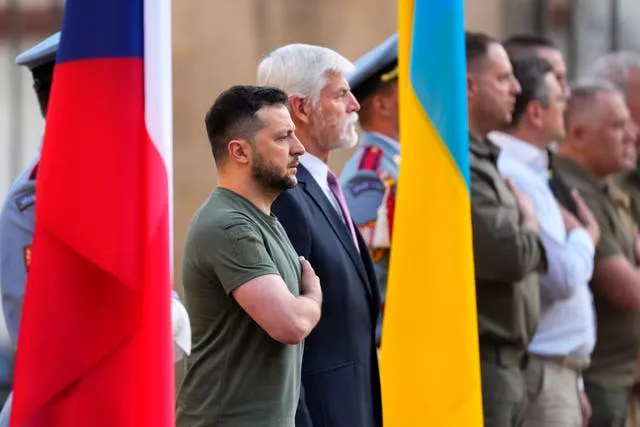
Also on Thursday, Bulgaria’s parliament approved a declaration of support for Ukraine to join the Nato military alliance once the war is over.
According to the declaration, the fastest track to the restoration of peace in Ukraine, the Black Sea region and Europe is Russia’s full and immediate withdrawal beyond the internationally recognised borders of the affected sovereign states.
The declaration, which was backed by a majority in the parliament, also called for continued military and technical support for Ukraine so it can defend itself.
The document was opposed by the Socialist party and a nationalist pro-Kremlin group.
Later in the day, Mr Zelenskiy faced opposition to sending military supplies to Ukraine from Bulgaria’s largely ceremonial president, Rumen Radev.
“I continue to maintain that this conflict has no military solution, and more and more weapons will not solve it,” Mr Radev said.

He called for “consistent efforts to de-escalate, for a ceasefire and a peaceful solution with the tools of diplomacy”.
Although the presidential post in Bulgaria is mostly ceremonial, it provides a strong platform to influence public opinion. Large parts of the population share pro-Russian sympathies based on historical and cultural bonds between the two nations.
In Prague, Mr Zelenskiy thanked Mr Pavel for his country’s support. The Czech Republic has been a staunch supporter of Ukraine in its fight against the Russian aggression and the Czech president said it is not going to change.
The Czech Republic gave Ukraine arms, including heavy weapons such as Soviet-era tanks, armoured vehicles and ammunition. The country has accepted a total of 500,000 refugees from Ukraine.
Ahead of the Nato summit, the presidents of an informal group known as the Bucharest Nine, the nations in the eastern-most parts of the Nato alliance, voiced their support in June for Ukraine’s eventual membership “once conditions allow”.
The nine countries are Bulgaria, the Czech Republic, Estonia, Hungary, Latvia, Lithuania, Poland, Romania and Slovakia.
Meanwhile, the European Union has taken a major step in approving plans to boost its anaemic production of ammunition and missiles within the 27-nation bloc, to both defend itself and quickly help Ukraine in trying to push back the invasion by Russia.
The EU presidency announced early Friday that the member states and the EU Parliament reached a deal “to urgently mobilise” half a billion euros from its budget for an Act in Support of Ammunition Production.
The deal follows up the decision by EU leaders in March to boost urgently needed ammunition deliveries to Ukraine, which were then sought to start a counter-offensive against Russian forces.
